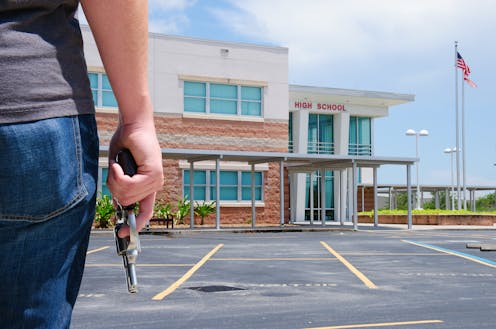School safety commission should not worry about violence in entertainment media
- Written by Christopher J. Ferguson, Professor of Psychology, Stetson University

On June 21, I testified before Education Secretary Betsy Devos’s school safety commission on the impact that violence in entertainment media has on violence in society.
I’m a psychologist who has studied violent media for 15 years and published dozens of studies[1] on the topic in peer-reviewed journals.
As I told the commission, current evidence suggests that the impact of violence in entertainment media is precisely zero and the commission would be better served attending to other issues.
Here are five main takeaways from my testimony:
1) Violence down despite more violent media
Society’s consumption of entertainment violence has been associated with significant[2] declines[3] in actual violence in society. The reality is that youth violence has dropped by over 80 percent[4] over the last 25 years even as society has consumed more violence games and movies.
2) Media violence is not a risk factor
A few dozen studies track kids over time to see if entertainment media at an early point in life predicts bullying, youth violence or later arrests. Studies from this pool of research generally find[5] that exposure to entertainment violence is not a risk factor for later violent behavior. Instead, issues like mental health[6] and family environment[7] tend to be real risk factors for youth violence.
3) Mass shooters don’t consume much violent entertainment
Data on mass shooters, dating back to a 2002 U.S. Secret Service/Department of Education report[8] and updated more recently in my work[9] with Villanova’s Patrick Markey, suggest that mass shooters consume less, not more, entertainment violence than other males their age[10]. Society’s obsession with video games and mass shooters stems from confirmation bias – a psychological phenomenon in which we attend to cases that fit our beliefs and ignore those that don’t, such as the Las Vegas shooting massacre[11] of 2017, a case in which the shooter was a 64-year-old male. Further, even some young shooters, like the Virginia Tech[12] and Sandy Hook[13] shooters, were found to prefer nonviolent rather than violent games.
4) Other countries less violent
Data that look at trends across countries find no relationship between entertainment consumption and societal violence. For instance, some of the most video game-loving countries, such as the Netherlands and South Korea, tend to be among the least violent[14].
5) No scholarly consensus
Lastly, surveys of scholars[15] make clear there is no consensus that entertainment causes violence. In fact, only a vocal minority of scholars who study media truly believe that entertainment media causes violence in society. If the school safety commission really wants to reduce violence in schools, one thing is absolutely clear to me: Focusing on entertainment violence is entirely a waste of time.
References
- ^ published dozens of studies (scholar.google.com)
- ^ significant (onlinelibrary.wiley.com)
- ^ declines (psycnet.apa.org)
- ^ 80 percent (www.childstats.gov)
- ^ generally find (www.researchgate.net)
- ^ mental health (christopherjferguson.com)
- ^ family environment (www.ncbi.nlm.nih.gov)
- ^ 2002 U.S. Secret Service/Department of Education report (www.gpo.gov)
- ^ my work (www.researchgate.net)
- ^ other males their age (www.researchgate.net)
- ^ Las Vegas shooting massacre (www.washingtonpost.com)
- ^ Virginia Tech (web.archive.org)
- ^ Sandy Hook (publicintelligence.net)
- ^ least violent (www.washingtonpost.com)
- ^ surveys of scholars (onlinelibrary.wiley.com)
Authors: Christopher J. Ferguson, Professor of Psychology, Stetson University

